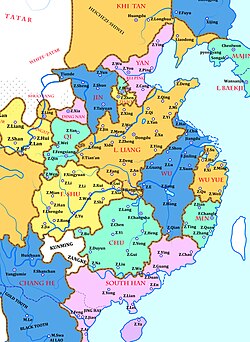| Great Shu / Han大蜀 / 漢 | |||||||||
|---|---|---|---|---|---|---|---|---|---|
| 907–925 | |||||||||
 | |||||||||
| Capital | Chengdu | ||||||||
| Common languages | Ba–Shu Chinese | ||||||||
| Government | Monarchy | ||||||||
| Emperor | |||||||||
| • 907–918 | Wang Jian | ||||||||
| • 918–925 | Wang Zongyan | ||||||||
| Historical era | Five Dynasties and Ten Kingdoms Period | ||||||||
| • Foundation of the State of Shu under Tang rule | 903 | ||||||||
| • Fall of the Tang dynasty | June 1, 907 907 | ||||||||
| • Ended by the Later Tang | 925 925 | ||||||||
| Currency | Chinese coin, Chinese cash | ||||||||
| |||||||||
| Today part of | China | ||||||||
| Shu had changed its country name from "Shu" to "Han" in 917–918. | |||||||||

Great Shu (Chinese: 大蜀; pinyin: Dàshǔ), known in historiography as the Former Shu (Chinese: 前蜀; pinyin: Qiánshǔ) or occasionally Wang Shu (王蜀), was a dynastic state of China and one of the Ten Kingdoms during the Five Dynasties and Ten Kingdoms period. It existed from 907 to 925 CE.
The country's name changed from "Shu" to "Han" (Chinese: 漢; pinyin: Hàn) in 917–918, which is not to be confused with another contemporaneous kingdom during the same Five Dynasties and Ten Kingdoms period, the Southern Han (traditional Chinese: 南漢; simplified Chinese: 南汉; pinyin: Nán Hàn), 917–971 CE.
Rulers
| Temple Names ( Miao Hao 廟號 miao4 hao4) | Posthumous Names ( Shi Hao 諡號 ) | Personal Names | Period of Reigns | Era Names (Nian Hao 年號) and their according range of years |
|---|---|---|---|---|
| 高祖 gao1 zu3 | Too tedious thus not used when referring to this sovereign | 王建 wang2 jian4 | 907–918 | Tianfu (天復 tian1 fu4) 907 Wucheng (武成 wu3 cheng22) 908–910 |
| Did not exist | Did not exist | 王衍 wang2 yan3 | 918–925 | Qiande (乾德 qian2 de2) 918–925 Xiankang (咸康 xian2 kang1) 925 |
| Family tree | |||||
| Wang Jian 王建 847–918 Gaozu 高祖 907–918 | |||||
| Wang Yan 王衍 899–925 Houzhu 后主 918–925 | |||||
See also
References
- Mote, F.W. (1999). Imperial China (900–1800). Harvard University Press. pp. 11–12, 14–15. ISBN 0-674-01212-7.
Further reading
- Wang, Hongjie (2011). Power and Politics in Tenth-Century China: The Former Shu Regime. Amherst: Cambria Press. ISBN 978-1604977646.
| Five Dynasties and Ten Kingdoms period (Timeline) | |
|---|---|
| Five Dynasties | |
| Ten Kingdoms (Ten States) | |
| Other states | |
| De facto independent entities | |
| Neighboring states | |
| Histories | |
| Sichuan topics | |||||
|---|---|---|---|---|---|
| Chengdu (capital) | |||||
| General | |||||
| History |
| ||||
| Geography | |||||
| Culture | |||||
| People | |||||
| Religion | |||||
| Languages |
| ||||
| Tourist attractions | |||||
| |||||
- Former Shu
- Five Dynasties and Ten Kingdoms
- Former countries in Chinese history
- History of Sichuan
- 10th-century establishments in China
- 907 establishments
- 920s disestablishments
- 10th-century disestablishments in China
- States and territories established in the 900s
- States and territories disestablished in the 920s
- 925 disestablishments
- Former kingdoms